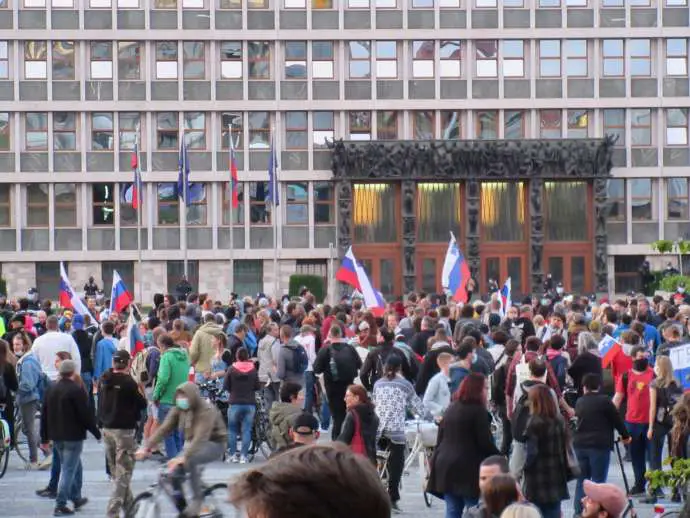STA, 21 June 2020 - Most opposition parties commented on the first 100 days of the Janez Janša new government very critically, highlighting opaque procurement of PPE, contentious staffing and what they perceive as inappropriate and divisive rhetoric by the PM. The coalition on the other hand is content with its handling of the crisis and is focused on future projects.
Several of the opposition parties did not mince their words when reflecting on the centre-right government, starting with the former ruling Marjan Šarec List (LMŠ), which described it as "ideological, unfair and therefore also uncooperative and full of corrupt methods".
"It has used the epidemic to clash with the opposition and journalists and reacted to any criticism, even of the most benevolent kind, with discreditation attacks on Twitter and its party 'media outlet" that is financed from abroad. All of these bad party media practices have been transferred by the PM to official government communication channel too," the LMŠ told the STA.
While also criticising the coronavirus stimulus measures as too complex and ineffective, the LMŠ highlighted what it sees uneconomical and opaque purchases of medical and protective equipment during the epidemic, saying "the government enabled high margins and profits for selected companies".
The LMŠ moreover accused the government of fomenting ideological issues and attacking state institutions. It expressed concern over the silence or "only theoretical distancing of the [junior coalition] Modern Centre Party (SMC) and Pensioners' Party (DeSUS)".
These points were largely also echoed by the SocDems and the Left, the former saying that "scandal followed scandal" and listing PPE procurement, the condoning of the Croatian Ustaša fascist movement, the deriding of Slovenia abroad, attempts to subjugate public broadcaster RTV Slovenija, attacks by top officials against individuals, and the sowing of divisions.
"We've never before had a prime minster that would use Twitter to divide people every day and erect culture war smokescreens to conceal his own and the government's incompetence," the leader of the Left, Luka Mesec, wrote.
Mesec also argued many of the government's crisis measures had been poorly thought through, while he praised the basic income for the self-employed and the subsidising of the unemployment allowances of temporarily redundant workers.
SAB's Alenka Bratušek meanwhile also had some words of praise for the government's handling of the coronavirus crisis, an exception being equipment procurement, which she said needed to be investigated. She was moreover critical of what she sees as "completely unnecessary letters sent to European institutions".
Zmago Jeleničič of the opposition National Party (SNS) on the other hand argued this was the first government that had major results to show after only 100 days in power.
"The good work is reflected in the raging of a part of the opposition, which is filing no confidence motions and organising cycling tours," Jeleničič said in reference to the cycling protesters who have been taking to the streets each Friday.
Meanwhile, the four coalition parties feel proud of the tackling of the Covid-19 crisis, which was at the centre of their efforts. They are announcing a focus on the commitments in the coalition agreement, especially demographic and healthcare challenges.
"Slovenia has come out of this test victorious and was the first country in the EU to declare the end of the epidemic," the senior coalition Democrats (SDS) wrote, saying the coalition was firm and ready for new challenges.
The parties described the relations in the coalition as good, with the SMC, New Slovenia (NSi) and DeSUS rejecting allegations they were being subjugated by the SDS.
While some criticism of the PM's communication methods was voiced by DeSUS deputy group head Franc Jurša, he also spoke of the rhetoric of the political left moving to the streets, which he said was bad for Slovenia.
DeSUS would like to see fewer ideological topics, arguing this was a point that could destabilise the coalition in the future. He highlighted the issue of home guards, a type of paramilitary groups patrolling borders, and the lifting of a ban on a concert by a Croatian singer said to be glorifying the WWII Ustaša regime in Croatia.
Jožef Horvat of the NSi said the "spirit in the county hasn't been as poor as now in a long time", but he too pointed to the source of this being the level of communication in parliament, arguing it sometimes verged on criminal behaviour. Asked whether government officials were to blame as well, he said the NSi would also prefer "to see a tweet or two less".
Statements by the coalition partners indicated some pending changes at ministerial posts that will reflect the fact that the SMC lost two of its MPs in recent months to the LMŠ and SD. The coalition now has 46 MPs in the 90-member National Assembly, but its proposals are often backed by the three SNS MPs as well.
All our stories on the recent protests in Slovenia can be found here






